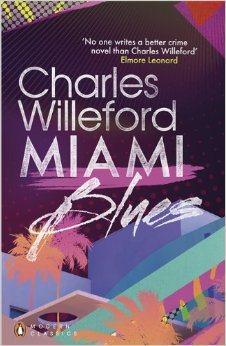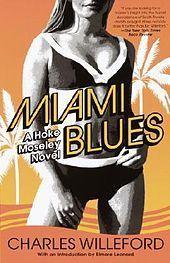Miami Blues, by Charles Willeford
If you’re even slightly a crime fan, I can save you some time on this review. You’ll like this one. Go pick up a copy.
If however you’d like a little more detail, read on.

That’s the Penguin Modern Classics cover, which I think is pretty good. Unfortunately it’s not the one I have, which is below. This one’s fine, but more generic and there’s nobody remotely like that woman in this book:

In my review of Kevin Barry’s City of Bohane I commented on his opening sentence and paragraph. Barry knows how to start a book, there’s no question to it, but Willeford’s no slouch in that department either. Here’s Willeford’s opener:
Frederick J. Frenger, Jr., a blithe psychopath from California, asked the flight attendant in first class for another glass of champagne and some writing materials. She brought him a cold half-bottle, uncorked it and left it with him, and returned a few moments later with some Pan Am writing paper and a white ball point pen. For the next hour, as he sipped champagne, Freddy practiced writing the signatures of Claude L. Bytell, Ramon Mendez, and Herman T. Gotlieb.
As soon as I read that I knew I was in good hands.
It’s the early ’80s. Freddy has headed to Miami to make a new life for himself. He’s new out of jail, armed with three wallets stolen back West before he got on the plane. Willeford uses Freddy’s examination of his loot to neatly establish his essential lack of empathy:
As he looked through the three wallets he found himself wondering about their owners. One wallet was eelskin, another was imitation ostrich, and the third was a plain cowhide billfold filled with color snapshots of very plain children. Why would any man want to carry around photographs of ugly children in his wallet? And why would anyone buy imitation ostrich, when you could get an authentic ostrich-skin wallet for only two or three hundred dollars more? Eelskin he could understand; it was soft and durable, and the longer you carried it in your hip pocket the softer it got.
Freddy has no concept of why a man might have a cheap wallet when expensive ones are easily available at knife or gunpoint. He certainly has no idea of why a man might have photos of children if the children don’t look good. Freddy, it’s fair to say, is not a people person.
On arriving at Miami airport Freddy gets accosted by a Hare Krishna guy trying to collect money for charity. The Krishna-guy pins a piece of candy to Freddy’s lapel. It’s a new suit, and Freddy doesn’t like having a hole made in it. He casually snaps the guy’s finger and leaves him lying on the carpet unconscious from pain. Nobody cares, the Krishna-guy was a pest anyway. Freddy isn’t the only person in Miami lacking empathy.
Soon Freddy’s shacked up with Susan Waggoner, a student originally of Okeechobee who found nothing in Miami but work as a mediocre hooker and English lit classes she doesn’t understand. Freddy’s dreaming of the big score and Susan wouldn’t say no to a slice of that, but Freddy just isn’t a big picture guy and he’s not nearly as smart as he thinks he is.
Freddy’s actions leave a trail, and before long Miami detective Hoke Moseley is looking very hard at Freddy convinced there’s something badly wrong about him. In another neat scene Freddy claims to be at college with Susan, but Hoke notices that Freddy’s upper-body muscles are a lot more developed than his lower, indicating working out in a cell, and that when Freddy eats some pudding he puts his free arm around the bowl to stop anyone from trying to grab it.
Miami Blues hums along with a nicely black sense of humor and a fondness for running jokes. Hoke has dentures, and keeps having thugs take them from him leaving him literally toothless. He ends up in hospital for a while with a broken jaw, and everyone who visits brings him a box of gift fudge. When he gets out he grows a beard, too sore to shave, and everyone he meets criticises it saying it makes him look like some actor or other but a different one every time.
The jokes might sound a little cruel, seeing them off the page and set down in that paragraph above, but they’re not. It’s more that Hoke’s life isn’t neat and the people around him are mostly trying their best but get things wrong.
The plot depends on a massive early coincidence, one so huge that you just have to accept it and move on. It gets things moving, but as with the jokes it underlines that this is crime with a comic twist, more Columbo than Law and Order. Willeford’s here to entertain rather than to depress.
Miami Blues is of course filled with snappy dialog. Here Hoke talks to his partner:
“Is the governor a Jesuit?” “That’s a Catholic, isn’t it?” “An educated Catholic, the way it was explained to me.”
Here, later, Hoke’s been assigned a new female partner. His old one comments:
Marie would have a fit if I had myself a female partner.” “I thought Marie was liberated.” “She is, but I’m not.”
The focus shifts between Freddy and Hoke, contrasting the two. Hoke is Freddy’s opposite, crumpled and beaten down but full of messy humanity. They spar, but where Freddy has the edge in strength and viciousness Hoke’s much, much smarter.
In many ways, on paper at least, Freddy has the better life. Freddy has money; Hoke’s broke, paying alimony and his daughter’s orthodontist bill. Freddy lives in Susan’s beautiful and clean apartment on an unfinished housing development, quiet and private; Hoke lives in a free room filled with unwashed socks and empty bottles in a cheap hotel where he acts as unpaid security, surrounded by pensioners and Cuban-exiles. Freddy spends his evenings with his girl, getting home cooked meals; Hoke spends his evenings helping dementia-afflicted neighbours back to their rooms.
Hoke though has friends, and people whose lives he makes a difference to. Freddy only has people he transacts with, and while it’s true he makes a difference to peoples lives, it’s not a difference they generally welcome. There’s no glamourising of the psychopath here. Freddy gets the immediate rewards, sure, and given the kind of man Freddy is there’s no way he’d ever envy Hoke’s life. Me though, I’d rather be Hoke any day of the week.
Other reviews
None I know of, but Guy Savage has reviewed a whole bunch of Charles Willeford novels here and is clearly something of a fan. In fact, if it hadn’t been for Guy’s reviews I probably wouldn’t have read this when I did, so thanks as ever to Guy.
Filed under: Crime Fiction, Willeford, Charles Tagged: Charles Willeford, Hoke Moseley

